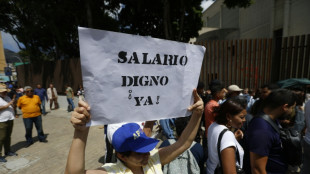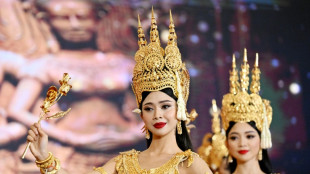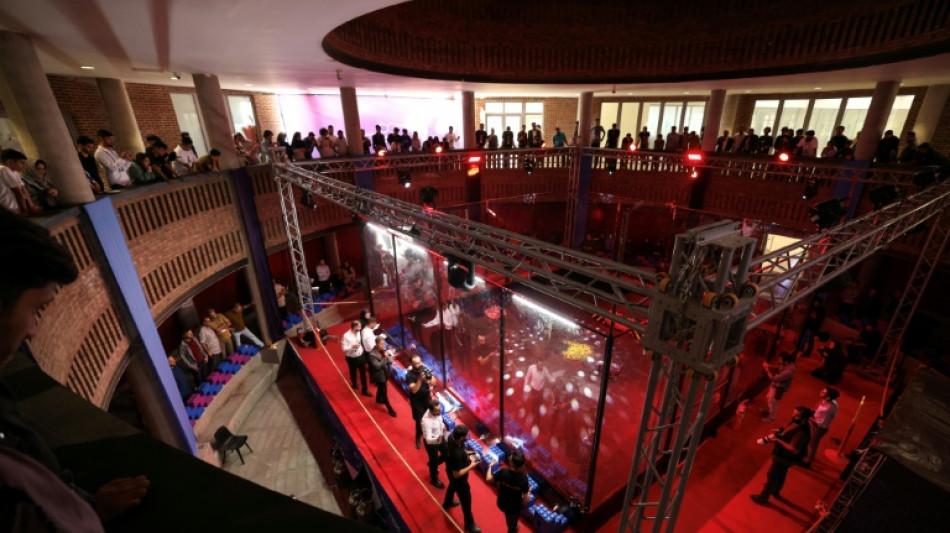
-
 Munsey leads Scotland to 207-4 against Italy at T20 World Cup
Munsey leads Scotland to 207-4 against Italy at T20 World Cup
-
Venezuela's Machado says ally 'kidnapped' after his release
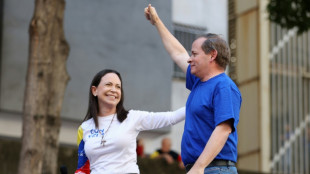
-
 Japan restarts world's biggest nuclear plant again
Japan restarts world's biggest nuclear plant again
-
Bangladesh poll rivals rally on final day of campaign

-
 Third impeachment case filed against Philippine VP Duterte
Third impeachment case filed against Philippine VP Duterte
-
Wallaby winger Nawaqanitawase heads to Japan

-
 Thailand's Anutin rides wave of nationalism to election victory
Thailand's Anutin rides wave of nationalism to election victory
-
Venezuela's Machado says ally kidnapped by armed men after his release

-
 Maye longs for do-over as record Super Bowl bid ends in misery
Maye longs for do-over as record Super Bowl bid ends in misery
-
Seahawks' Walker rushes to Super Bowl MVP honors

-
 Darnold basks in 'special journey' to Super Bowl glory
Darnold basks in 'special journey' to Super Bowl glory
-
Japan's Takaichi may struggle to soothe voters and markets

-
 Bad Bunny celebrates Puerto Rico at Super Bowl, angering Trump
Bad Bunny celebrates Puerto Rico at Super Bowl, angering Trump
-
Seahawks soar to Super Bowl win over Patriots

-
 'Want to go home': Indonesian crew abandoned off Africa demand wages
'Want to go home': Indonesian crew abandoned off Africa demand wages
-
Asian stocks track Wall St rally as Tokyo hits record on Takaichi win

-
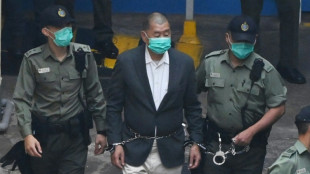 Hong Kong sentences pro-democracy mogul Jimmy Lai to 20 years in jail
Hong Kong sentences pro-democracy mogul Jimmy Lai to 20 years in jail
-
Bad Bunny celebrates Puerto Rico in joyous Super Bowl halftime show

-
 Three prominent opposition figures released in Venezuela
Three prominent opposition figures released in Venezuela
-
Japan PM Takaichi basks in historic election triumph
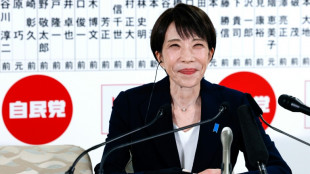
-
 Israeli president says 'we shall overcome this evil' at Bondi Beach
Israeli president says 'we shall overcome this evil' at Bondi Beach
-
'Flood' of disinformation ahead of Bangladesh election

-
 Arguments to begin in key US social media addiction trial
Arguments to begin in key US social media addiction trial
-
Gotterup tops Matsuyama in playoff to win Phoenix Open

-
 New Zealand's Christchurch mosque killer appeals conviction
New Zealand's Christchurch mosque killer appeals conviction
-
Leonard's 41 leads Clippers over T-Wolves, Knicks cruise

-
 Patriots-Seahawks Super Bowl approaches as politics swirl
Patriots-Seahawks Super Bowl approaches as politics swirl
-
Trump says China's Xi to visit US 'toward the end of the year'

-
 Real Madrid edge Valencia to stay on Barca's tail, Atletico slump
Real Madrid edge Valencia to stay on Barca's tail, Atletico slump
-
Malinin keeps USA golden in Olympic figure skating team event

-
 Lebanon building collapse toll rises to 9: civil defence
Lebanon building collapse toll rises to 9: civil defence
-
Real Madrid keep pressure on Barca with tight win at Valencia

-
 Dimarco helps Inter to eight-point lead in Serie A, Juve stumble
Dimarco helps Inter to eight-point lead in Serie A, Juve stumble
-
PSG trounce Marseille to move back top of Ligue 1

-
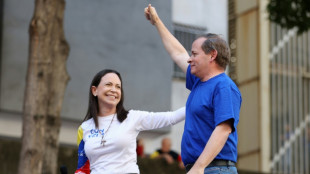 Two prominent opposition figures released in Venezuela
Two prominent opposition figures released in Venezuela
-
Hong Kong to sentence media mogul Jimmy Lai in national security trial

-
 Lillard will try to match record with third NBA 3-Point title
Lillard will try to match record with third NBA 3-Point title
-
Vonn breaks leg as crashes out in brutal end to Olympic dream

-
 Malinin enters the fray as Japan lead USA in Olympics team skating
Malinin enters the fray as Japan lead USA in Olympics team skating
-
Thailand's Anutin readies for coalition talks after election win

-
 Fans arrive for Patriots-Seahawks Super Bowl as politics swirl
Fans arrive for Patriots-Seahawks Super Bowl as politics swirl
-
'Send Help' repeats as N.America box office champ

-
 Japan close gap on USA in Winter Olympics team skating event
Japan close gap on USA in Winter Olympics team skating event
-
Liverpool improvement not reflected in results, says Slot

-
 Japan PM Takaichi basks in election triumph
Japan PM Takaichi basks in election triumph
-
Machado's close ally released in Venezuela

-
 Dimarco helps Inter to eight-point lead in Serie A
Dimarco helps Inter to eight-point lead in Serie A
-
Man City 'needed' to beat Liverpool to keep title race alive: Silva

-
 Czech snowboarder Maderova lands shock Olympic parallel giant slalom win
Czech snowboarder Maderova lands shock Olympic parallel giant slalom win
-
Man City fight back to end Anfield hoodoo and reel in Arsenal


Iranian tech prodigies battle it out with robots
Two machines resembling robotic vacuum cleaners sped around a ring colliding, shooting sparks and catching fire, as Iranian engineering students watched from behind plexiglass.
The dramatic clash was just one of many opportunities for competitors to go head-to-head at the country's Tech Olympics, to determine the future of its engineering talents.
Iran aspires to become a key regional player in emerging technologies, despite decades of international sanctions that have stifled its development.
The fields at this year's competition included robot battles, programming, artificial intelligence, as well as drones, cybersecurity and connected devices.
A few hours before his event, Alireza Hosseini put the final touches on combat robot Arash -- a rudimentary machine of wires and wheels without the appearance of a humanoid.
"What's more important than the design is the operator," the 21-year-old university student told AFP, referring to the person who remotely controls the robot.
"The design only represents a third of the work, but the operator decides how and where the robot attacks," said Hosseini, from Kerman in southern Iran.
Hosseini said his team of students in electrical engineering, electronics, computer science, mechanical engineering and design had been crowned Iran's robotics champion three times.
Launched last year at the government's initiative, the Tech Olympics serve as a talent pool for companies seeking potential recruits.
The coach of one team of under-18s appeared somewhat anxious before the start of the competition.
"Unfortunately, we started late, and the robot isn't quite ready yet," said Mr. Azizi, who did not give his first name.
- Iran's Silicon Valley -
Three referees were tasked with judging the robot fights, just like in wrestling, a sport at which Iran excels.
The collisions between machines produce sparks, and sometimes even balls of fire. Victory goes to the robot that disables its opponent.
The Tech Olympics take place on the outskirts of the capital Tehran, at the Pardis Technology Park -- nicknamed Iran's Silicon Valley -- where dozens of cutting-edge companies are located.
The organisers boast that they received more than 10,000 applications for the competition, which was whittled down to 1,000 spots in the elimination rounds.
A few foreign teams also participated. Iranian media mentioned more than a dozen countries ranging from neighbouring Iraq to far-away Romania.
Iran has invested sizable sums in emerging technologies, including robotics, with dozens of companies using them for a variety of applications.
In September, the country unveiled its first AI-powered robot, capable of accurately answering a wide range of legal questions, according to local media.
The military has also harnessed these technologies, including for its Aria combat robot, which uses AI to detect obstacles and move autonomously and was unveiled in September.
In 2021, veterinarians in Iran performed the first-ever remote surgery on a dog using Sina, a surgical robot entirely designed and manufactured domestically.
The Tech Olympics aims to prepare students for real-world situations.
Mohammad-Javad Asadolahi, a 21-year-old studying mechanical engineering at university, said he and his classmates designed a drone -- capable of taking off automatically and following a set trajectory -- from scratch using "60 to 70 percent Iranian technology".
"Our main difficulty was the lack of educational resources" in English and Persian, he said.
But "thanks to our knowledge and research, we have gradually succeeded".
P.Tamimi--SF-PST


